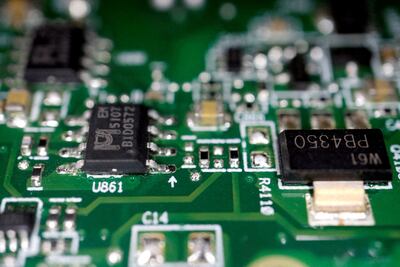As Keir Starmer jets around the world attending various summits, he’s got plenty of thinking time. He might like to dwell on the fact his government has got off to a sluggish start, how it’s being heavily criticised.
Part of his problem, as he keeps saying, is lack of cash. That’s what is holding him back, it’s why he and his Chancellor Rachel Reeves have had to make unpopular decisions, to try to rebalance the books and raise some much-needed extra revenue.
There are things, though, he could be doing that represent a win-win, do not cost the Earth and could see him lavished with praise – not least from the business community that is feeling especially sore and short-changed after being assured he was on their side, only for Reeves’s recent Budget to suggest the opposite.
One is contained in a new report from the think tank Policy Exchange. Its head of industrial policy and former Financial Times editor, Sir Geoffrey Owen, is making a strong case for Britain claiming a leading spot in semiconductors. Before Starmer dismisses the recommendation as too expensive and drops it in the pile marked ‘wishful thinking’, it does not cost a lot at all, relatively nothing compared with other initiatives and the rewards would be considerable.

Owen makes the point that Britain has fallen behind the rest of the world in the semiconductor race, not only losing out to the US and Asia but even trailing in Europe. In this strategically critical growth market, the UK has no broad, large-scale manufacturer able to go head-to-head with Infineon in Germany, NXP in the Netherlands and the Franco-Italian STMicroelectronics.
Sure, Britain did well with Arm, whose processor is used in mobile phones and other electronic devices, but the country lacks the breadth and capacity developed elsewhere. Specifically, he suggests not focusing on silicon chips, the industry standard, but compound semiconductors. “Devices based on these materials, which include silicon carbide and gallium nitride, are increasingly replacing or supplementing silicon in a range of applications, because of their low power consumption and other advantages – and the UK already has competitive strengths in this part of the industry.”
What’s missing is an open access foundry which could “play the same sort of role for firms that design or make compound semiconductors as silicon-based foundries play in Europe, the US and Asia”. The government should partner with industry to construct such a plant – on a greenfield site, or adjacent to an existing fabrication facility – to rejuvenate the industry and bring Britain quickly up to speed.
The UK is already a player, with a strong global reputation, in university-based semiconductor research and design. It’s turning those prototypes into mass production, which is lacking and sees others step smartly in and forge ahead. “A UK-based foundry would make it more likely that the output of academic research would be commercialised in the UK rather than overseas.”
There are suitable sites aplenty, not least at Plymouth where Plessey manufactures compound semiconductor display technology, or Newport, which has an under-utilised building, known as Fab 10.
The bill, say industry experts, would be £500 million-£800 million ($630 million-$1 billion). That may seem steep for an administration which in its supposedly landmark Budget namechecked a primary school in Hartlepool destined for rebuilding (seriously). But consider: TSMC, the Taiwanese company, will receive up to $6.6 billion from the US government for its planned third fabrication plant in Arizona.
It doesn’t have to come entirely from the public purse. A public-private arrangement, with a consortium of semiconductor firms and private investors financing two thirds of the project, with the rest coming from the state, would work. The funding could be routed through the new National Wealth Fund.
For that amount, the UK would obtain a foundry capable of servicing a wide spectrum of customers from the Ministry of Defence and its suppliers to net-zero manufacturers, including those of electric cars and wind turbines, and current and future communication systems.
This is what ought to make Starmer sit up and take notice. The world number one in semiconductors is Nvidia, with a market cap of $3.64 trillion and 29,600 employees. But in the jargon, Nvidia is ‘fabless’, it does not make them, it contracts out production. Next in the ranking is TSMC, which does, at its own foundries.
TSMC is worth $839 billion and has 73,090 staff. It’s the only foundry firm in the top 12 semiconductor companies – the Dutch NXP ($57 billion, 34,200 people), Germany’s Infineon ($38 billion, 58,600 staff) and the French Italian STMicroelectronics ($23 billion and 51,323) occupy the bottom three places. Those three are all IDMs or integrated device manufacturers, so they plan and produce their semiconductors. There is no one to rival TSMC inside that elite dozen and no one in Europe. A British foundry specialist would be pushing at an open door.
Owens’ report echoes a study last year from the Centre for Policy Studies or CPS. Its author, Gerard B Lyons, said: “The UK has a nascent semiconductor sector, but it is not a major player in traditional silicon chips. And, given the direction of travel, it should not try to become one. The UK does, however, have internationally recognised strengths in other more competitive parts of the sector. These include world-leading chip design companies, such as Arm, and early-stage R&D and basic IP. For the UK, it should be about playing to these existing strengths and having the right policy environment in place so it is well positioned to capitalise on the next generation of semiconductor technology. It is about doubling down and looking forward.”
That’s two of the most influential think tanks, Policy Exchange and CPS. They’re on the right side of politics, so for once Starmer’s natural critics would be applauding. It's a good news story about Britain’s industrial future and economic potential.
Amid all the other requests piling up in his in-tray, this one really is a no-brainer.


